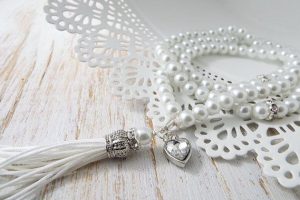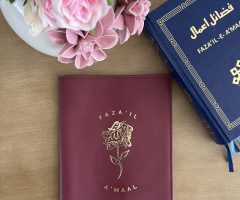The Queen of Jannah
Hazrat Faatimah (radhiyallahu ‘anha) was the youngest daughter of Rasulullah (sallallahu ‘alaihi wasallam) and was most beloved to him. The extent of his love for her can be gauged from the fact that the last person and first person that he would meet when departing or returning from an expedition was his beloved daughter, Hazrat Faatimah (radhiyallahu ‘anha). Shortly before departing from this world, Rasulullah (sallallahu ‘alaihi wasallam) informed her that she will be the queen of all the women in Jannah. (Saheeh Bukhaari #3623-3624)
The fact that from all the women who came in the world, Allah Ta‘ala selected her and crowned her with the position of being the queen in Jannah is sufficient for us to understand that she is the greatest of all women. Hence, every aspect of her life was blessed, most beautiful and worthy of emulation. There are thus countless lessons that can be learnt from her exemplary life. Among these lessons are that she led a life of complete purity and righteousness, remained obedient to the teachings of Rasulullah (sallallahu ‘alaihi wasallam), and always adopted purdah, thereby concealing herself from the gazes of strange men.
On one occasion, Rasulullah (sallallahu ‘alaihi wasallam) asked the Sahaabah (radhiyallahu ‘anhum) as to what was the most beneficial thing for women. However, none of the Sahaabah (radhiyallahu ‘anhum) gave any answer. When Hazrat Ali (radhiyallahu ‘anhu) returned home, he put forth the question to Hazrat Faatimah (radhiyallahu ‘anha) who spontaneously answered, “The thing most beneficial for women and most beloved in the sight of Allah Ta‘ala is that they do not see men and that men do not see them (i.e. they do not have any contact with men and vice versa).” When Rasulullah (sallallahu ‘alaihi wasallam) was informed of her answer, he expressed great happiness and mentioned, “Faatimah is part of me.” (Majma’uz Zawaa’id #15200 and Kanzul Ummaal #46012)
Hazrat Faatimah (radhiyallahu ‘anha) showed such importance to the command of Rasulullah (sallallahu ‘alaihi wasallam) regarding purdah that she firmly held onto it until the very end of her life. Prior to her demise, she said to Hazrat Asmaa bint Umais (radhiyallahu ‘anha), “I feel ashamed of being carried on a bier by men who will see the shape of my body through the cloth placed over my kafan.” Hazrat Asmaa (radhiyallahu ‘anha) replied, “O daughter of Rasulullah (sallallahu ‘alaihi wasallam)! Shall I not show you a solution which I learnt in the land of Abyssinia?” Saying this, she asked for some palm leaves to be brought. She then shaped the leaves into a frame which she placed over the bier, and then draped the cloth over the frame. In this way, the body of a deceased woman would be entirely concealed. When Hazrat Faatimah (radhiyallahu ‘anha) saw this, she smiled and said, “May Allah Ta‘ala conceal your faults as you have assisted me to conceal my body!” (Usdul Ghaabah 5/368)
From this incident, we see that Hazrat Faatimah (radhiyallahu ‘anha) had such great concern for purdah, that she could not even tolerate the shape of her body being revealed to strange men after her death. May Allah Ta‘ala bless the women of this ummah to follow in the footsteps of Hazrat Faatimah (radhiyallahu ‘anha).
 Ihyaaud Deen An Effort to Revive Deen in Totality
Ihyaaud Deen An Effort to Revive Deen in Totality





